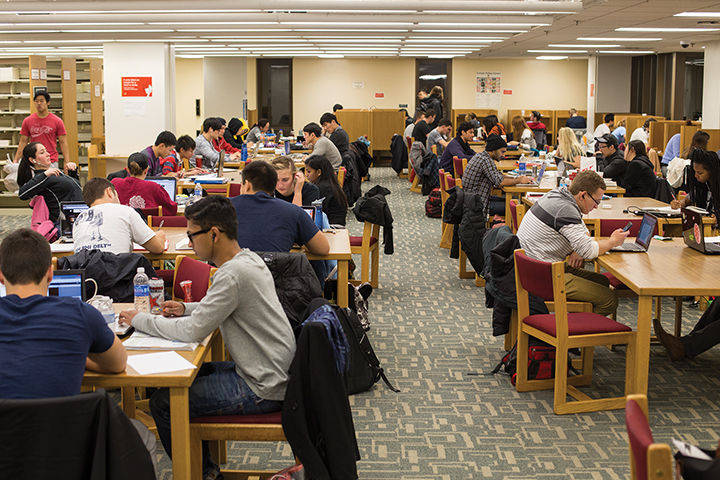Views expressed in opinion columns are the author’s own.
I never thought I’d admit it, but I would give anything to attend my 9:30 a.m. lecture in person. I would even happily show up to an 8 a.m. class if it meant learning face-to-face. Virtual learning has brought the intrinsic motivation to study and turn in assignments to an appalling low, and I know I’m not the only one struggling to complete coursework.
Online school feels like it doesn’t matter. It feels optional, even when it clearly isn’t. This lack of internal motivation felt by so many students opens the door for cheating — and not just on simple worksheets or discussions, but on quizzes and exams, too. Considering the potential for academic dishonesty, combined with a complete lack of testing security standardization, this university needs to think seriously about canceling this semester’s final exams.
The argument to cancel finals could be made for a few reasons: the unprecedented disruption to learning, students’ uncertain financial situations leading to a justified lack of focus, and lack of access to an environment conducive to academic success. But the real reason there shouldn’t be finals? Cheating.
Academic dishonesty is clearly nothing new, and it doesn’t just occur in an online setting. But when students are removed from a physical environment where intellectual integrity is taken seriously, are there really even consequences?
Is a professor going to catch someone looking over their classmates’ exam? Is a TA going to know a student used notes to help with an assignment? The lack of accountability doesn’t mean all students are going to lose their morality and purposely cheat, but it does partly eliminate the fear of facing repercussions for doing so.
To protect the integrity of their exams, some professors already use Honorlock — a test proctoring software that employs audiovisual recording systems to ensure students aren’t cheating. But some don’t. Even with safeguards like Honorlock, there’s still no guarantee students won’t find ways around it. Spoiler alert: There are already countless Reddit threads advising students how to get around these systems.
This university lacks a firm policy directing professors to use test security. Normally, having one wouldn’t be necessary: Professors can literally watch their students take their exams in person. And some students don’t even take a test or exam for their final grade. This flexibility is great for allowing this university’s colleges and academic departments to determine final grade structures that best fit their students’ fields of study. It’s not great for ensuring that one student won’t have a potential academic advantage over another if their final exam isn’t protected by a test security program.
So where does that leave the academic integrity of finals? Sandwiched between no standardization of test security and unlimited online information at students’ fingertips, the concept of virtual finals are looking more and more like a joke. The whole point of a final exam is for students to demonstrate their understanding of a topic. Yet online finals will do just the opposite — they’ll only show how willing students are to be resourceful and use outside resources to succeed.
This university has already made available a pass/fail option for courses. Why? Because administrators understand that nothing about what’s happening right now creates a normal academic environment for students to thrive in. It’s time to make the right decision and do the same with finals.
Maya Rosenberg is a sophomore journalism and public policy major. She can be reached at maya.b.rosenberg@gmail.com.



